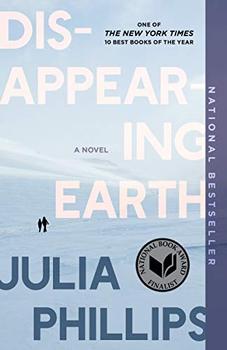Summary | Excerpt | Reading Guide | Reviews | Beyond the Book | Readalikes | Genres & Themes | Author Bio

Over soft potatoes and seared sausage, they told each other stories. How Oksana had said she'd discovered texts to yet another woman on her husband's phone—"Everyone in the office is talking about it. He's an asshole," Max said with his mouth full.
"They need to end it already."
"Good luck giving that advice," Max said. "I try as much as possible to avoid telling Oksana what to do." Katya put her plate down and rested her hands on Max's pant leg as he ate. Under her palms, the swell of his thigh.
Through the woods came the drunk rise and fall of people at a neighboring campsite singing. The trees made a black wall. Those voices, the ash in the air, and the chattering night put Katya in mind of their first weekend together. "Any updates from the search?" she asked.
Max shook his head. "And there won't be any more volunteers going out after it snows. Lieutenant Ryakhovsky says now that the girls may have been taken off Kamchatka."
"Come on," Katya said. "In what, a passenger plane?"
"I don't know. A ship."
"A cruise ship? To Sapporo?" If so, Katya's colleagues would have found them. Customs inspected every vessel leaving by air or sea.
And air and sea were the sole options for leaving. Though Kamchatka was no longer a closed territory by law, the region was cut off from the rest of the world by geography. To the south, east, and west was only ocean. To the north, walling off the Russian mainland, were hundreds of kilometers of mountains and tundra. Impassable. Roads within Kamchatka were few and broken: some, to the lower and central villages, were made of dirt, washed out for most of the year; others, to the upper villages, only existed in winter, when they were pounded out of ice. No roads connected the peninsula to the rest of the continent. No one could come or go over land.
"A cargo ship," he said. "Maybe."
Katya had to laugh. "Aha," she said. The campfire flickered over Max's face.
"I'm only repeating what the detective told all of us. It's possible, isn't it? Because we looked everywhere else. We found nothing."
Everywhere else, he said, as though Petropavlovsk-Kamchatsky's borders marked the edges of existence. "Those girls didn't leave the peninsula," she said. "Couldn't he have hidden their bodies? In a garage, a construction site, the woods?"
"We searched those places," he said. "For weeks. Covered every neighborhood."
"Outside Petropavlovsk, then," Katya said. "You don't think he took them along the road to the western coast? Or north?"
Max set his plate down. "Maybe he hid them in a national park. Threw them into a geyser."
"Maybe so," Katya said. He grimaced. "He could've done anything, that's my point," she said. "Driven them six hours away and enrolled them as his own children in some village school."
"Well, yes. There's no limit to the possibilities. So the police asked us only to focus on what was most likely," Max said. "This was someone from Petropavlovsk. Oksana described a white man."
"Did she?"
"Normal-looking, she said."
Katya did not disagree with that. Instead, she said, "She barely saw him. Anyway, it's not all natives out there."
"She saw his car," Max said. "A shiny dark car, she told us. No one comes down unpaved roads from the villages without getting covered in dust. So think: how would this person, living in the city, desperate, maybe crazy, most likely leave? He would know ships come and go daily. The detective says he could have bribed his way into a shipping container."
"Or maybe this person does what is unlikely," she said. "Went to a geyser after all. This is a man who preys on children. Who knows what he might be capable of?" She was talking like a tabloid reporter, she knew, but that post-kidnapping touchiness had crept back on her. If the police had solved the case already, she would not have to speak about such things. She did her job at the port well—the girls couldn't have left Kamchatka. Did everyone else in the city do theirs?
Excerpted from Disappearing Earth by Julia Phillips. Copyright © 2019 by Julia Phillips. Excerpted by permission of Alfred A. Knopf, a division of Penguin Random House LLC. All rights reserved. No part of this excerpt may be reproduced or reprinted without permission in writing from the publisher.
Your guide toexceptional books
BookBrowse seeks out and recommends the best in contemporary fiction and nonfiction—books that not only engage and entertain but also deepen our understanding of ourselves and the world around us.